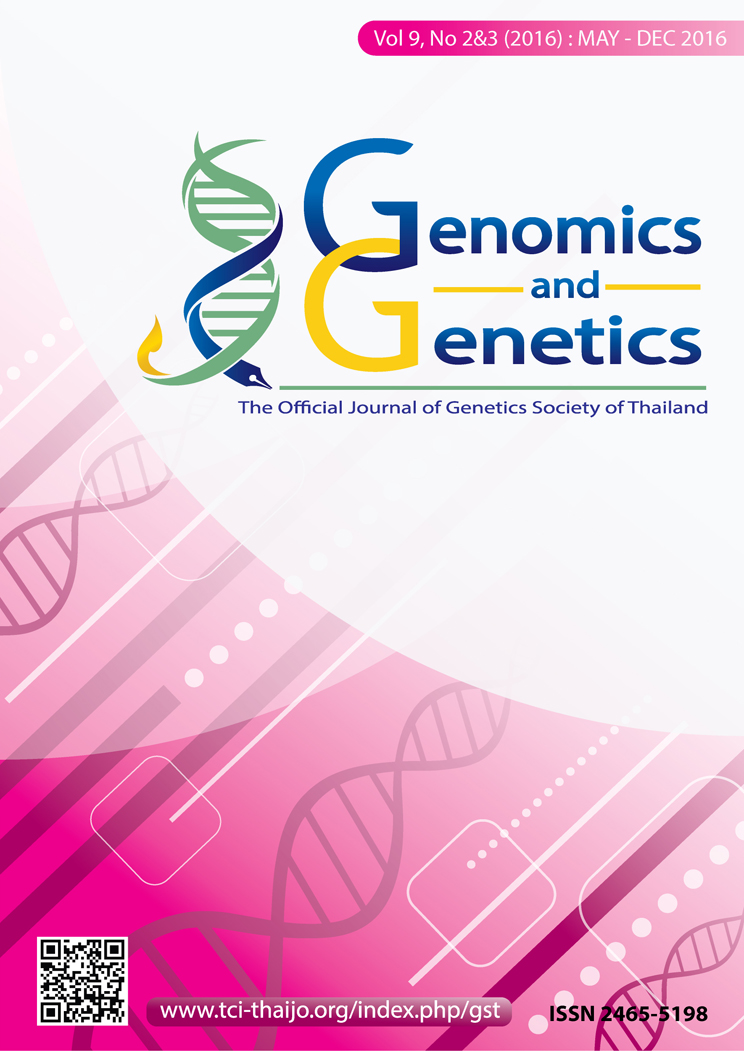Three Novel APC Mutations in Thai Familial Adenomatous Polyposis Patients
Keywords:
Familial adenomatous polyposis, APC gene, DHPLC, MutationsAbstract
Familial adenomatous polyposis (FAP) is an autosomal dominant genetic disease that is characterized by multiple adenomatous polyps in the colon and rectum. Adenomatous polyposis coli gene (APC) mutations are the causative event for FAP. APC consists of 15 exons, which encode 2,843 amino acids. The APC protein acts as a tumor suppressor and plays a role in several cellular processes. Here we investigated APC mutations in 20 unrelated Thai patients with FAP using denaturing high-performance liquid chromatography followed by DNA sequencing. Twenty mutations were identified in this study. Three mutations were novel mutations, including one nonsense mutation (c.2560A>T), one deletion mutation (c.4634_4638delCAAAT) and one indel mutation (c.3746_3748delinsAA). Data from mutations in Thai patients with FAP will be useful for molecular genetics diagnosis and genetic counseling of patients with FAP.
References
Beroud C and Soussi T (1996) APC gene: database of germline and somatic mutations in human tumors and cell lines. Nucleic acids research 24:121-124.
Bisgaard ML, Fenger K, Bulow S, Niebuhr E and Mohr J (1994) Familial adenomatous polyposis (FAP): frequency, penetrance, and mutation rate. Human mutation 3:121-125.
Bulow S, Faurschou Nielsen T, Bulow C, Bisgaard ML, Karlsen L and Moesgaard F (1996) The incidence rate of familial adenomatous polyposis. Results from the Danish Polyposis Register. International journal of colorectal disease 11:88-91.
CNIL (2014) The UMD- APC mutations database.
Gavert N, Yaron Y, Naiman T, Bercovich D, Rozen P, Shomrat R, Legum C and Orr-Urtreger A (2002) Molecular analysis of the APC gene in 71 Israeli families: 17 novel mutations. Human mutation 19:664.
Groden J, Thliveris A, Samowitz W, Carlson M, Gelbert L, Albertsen H, Joslyn G, Stevens J, Spirio L, Robertson M and et al. (1991) Identification and characterization of the familial adenomatous polyposis coli gene. Cell 66:589-600.
Half E, Bercovich D and Rozen P (2009) Familial adenomatous polyposis. Orphanet journal of rare diseases 4:22.
Kinzler KW, Nilbert MC, Su LK, Vogelstein B, Bryan TM, Levy DB, Smith KJ, Preisinger AC, Hedge P, McKechnie D and et al. (1991) Identification of FAP locus genes from chromosome 5q21. Science 253:661-665.
Laken SJ, Papadopoulos N, Petersen GM, Gruber SB, Hamilton SR, Giardiello FM, Brensinger JD, Vogelstein B and Kinzler KW (1999) Analysis of masked mutations in familial adenomatous polyposis. Proceedings of the National Academy of Sciences of the United States of America 96:2322-2326.
Nagase H and Nakamura Y (1993) Mutations of the APC (adenomatous polyposis coli) gene. Human mutation 2:425-434.
Nieuwenhuis MH and Vasen HF (2007) Correlations between mutation site in APC and phenotype of familial adenomatous polyposis (FAP): a review of the literature. Critical reviews in oncology/hematology 61:153-161.
Nishisho I, Nakamura Y, Miyoshi Y, Miki Y, Ando H, Horii A, Koyama K, Utsunomiya J, Baba S and Hedge P (1991) Mutations of chromosome 5q21 genes in FAP and colorectal cancer patients. Science 253:665-669.
Plawski A, Lubinski J, Banasiewicz T, Paszkowski J, Lipinski D, Strembalska A, Kurzawski G, Byrski T, Zajaczek S, Hodorowicz-Zaniewska D, Gach T, Brozek I, Nowakowska D, Czkwaniec E, Krokowicz P, Drews M, Zeyland J, Juzwa W and Slomski R (2004) Novel germline mutations in the adenomatous polyposis coli gene in Polish families with familial adenomatous polyposis. Journal of medical genetics 41:e11.
Polakis P (1997) The adenomatous polyposis coli (APC) tumor suppressor. Biochimica et biophysica acta 1332:F127-147.
Ruiz-Ponte C, Vega A, Carracedo A and Barros F (2001) Mutation analysis of the adenomatous polyposis coli (APC) gene in northwest Spanish patients with familial adenomatous polyposis (FAP) and sporadic colorectal cancer. Human mutation 18:355.
Schnitzler M, Koorey D, Dwight T, Tomaras C, Macrae F, Marsh D and Robinson B (1998) Frequency of codon 1061 and codon 1309 APC mutations in Australian familial adenomatous polyposis patients. Human mutation Suppl 1:S56-57.
Seeling JM, Miller JR, Gil R, Moon RT, White R and Virshup DM (1999) Regulation of beta-catenin signaling by the B56 subunit of protein phosphatase 2A. Science 283:2089-2091.
Sparks AB, Morin PJ, Vogelstein B and Kinzler KW (1998) Mutational analysis of the APC/beta-catenin/Tcf pathway in colorectal cancer. Cancer research 58:1130-1134.
Varesco L, Gismondi V, James R, Robertson M, Grammatico P, Groden J, Casarino L, De Benedetti L, Bafico A, Bertario L and et al. (1993) Identification of APC gene mutations in Italian adenomatous polyposis coli patients by PCR-SSCP analysis. American journal of human genetics 52:280-285.



